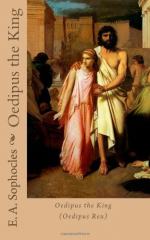|
This section contains 1,538 words (approx. 6 pages at 300 words per page) |

|
The Evolution of Tragedy in Dramatic Literature
Summary: The defintion of tragedy in dramatic literature and how it has evolved over the years. The elements of a tragedy are hamartia, hubris, peripeteia, anagnorisis, and catharsis. Sophocles's "Oedipus the King" is compared with Arthur Miller's "Death of a Salesman" to illustrate how the nature of tragedy in literature has changed.
There are many genres of dramatic literature: tragedy, epic and comedy are examples. Tragedy is a genre of dramatic literature which has been around for a long time, since the times of ancient Greece to modern times. As different tragedies were written throughout the times, the way tragedies were written has changed. The way that tragedies have changed can be evaluated by viewing tragedy as a system, with the elements being the hamartia, hubris, peripeteia, anagnorisis, and catharsis.
A tragedy is a serious play in which the main character, by some peculiarity of character, passes through a series of misfortunes leading to a final, devastating catastrophe.
There are 5 elements of a tragedy as a system, hamartia, hubris, peripeteia, anagnorisis, and catharsis. The hamartia is a term from Greek tragedy which literally means "missing the mark." The hamartia is the tragic flaw in which the main character possesses. The...
|
This section contains 1,538 words (approx. 6 pages at 300 words per page) |

|


